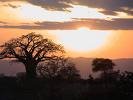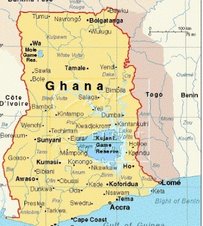Donald Amuar, our leader while we we were in the northern parts of Ghana, informed us that we are all implicated in the events of history. He said this as we were debriefing after our visit to the Pinkora Slave Camp. He followed up by saying that there is no reason for us to hide from what has happened. I am trying to apply that way of thinking to my experiences here. My younger brother, David, who is a 19 year veteran in the army (I think he is a Lt. Colonel by now) has told me that it usually takes him about two weeks before a newly visited nation begins to appear not so different to his eyes. I would have to say that that was good advice because now that I am three weeks into my visit (the half-way point), I am not seeing the poverty the same way; I am not seeing the challenges this nation faces the same way. I am beginning to see how this country is dealing with those challenges, and although they are very poor economically (compared to the US) how they are in the process of growing their economy. So when I hear Donald say that we are all implicated in the events of history, I am hearing him ask what is it that an individual proposes to do about it. I am not sure what the answer to that is, but I want to comment on it now.
Agya Koo Nimo (AKN for this posting), a legendary Ghanaian musician, is our leader while we are in the Kumasi area. His band has been asked to travel to Cote D'Ivoire early next week so we have packed a bulk of our work in Kumasi to the first five days we are here. We have just finished day three. On our first night, AKN brought his band of drummers, guitarists and dancers to perform for us. As we learned in the north it is acceptable to reward the band by placing a Cedi on the forehead of one of the dancers. It was raining on the pool deck and the dancing was good so I rewarded his efforts. The entire group splits all the money they collect. After the dancing portion of the show, AKN brought us in closer as he and his band acoustically performed for us. He would tell the story about which he was going to sing and then perform. I am going to relay two of those stories to you now. One was about a very old man who was who was planting a coconut tree. When his grandson saw this, he asked his grandfather, "Grandfather, why are you working so hard on a tree that you will never see grow to bear fruit?" The grandfather answered because it will connect me to the ancestors and it will help provide for you and your family for years to come. the grandfather continued by saying that we do these things because it connects us to the past and the future and that these links are very important. It also I believes shows the importance of working hard today for things they may never directly benefit us. It was very soft and soothing song that I enjoyed very much. There were 3 guitarists (one of which was AKN), and several percussion performers playing a variety of instruments. AKN was singing and there were back-up singers who provided nice rhythm with gentle clapping.
The next story I am going to tell you I took as a personal challenge for my visit here. I have also tied to the message I took with me from Donald during my visit to the north. AKN told a story that he said relates to nation-building. Before i can tell you the story it is important that you realize that the rainy season in Ghana lasts about four months from June to October, and then there is the dry season. The song the band performed was about how the ants work hard during the dry season, so that they could rest and enjoy the fruits of their labor during the rainy season. This is of course an age-old story told all over the world, but it helped me to see something about my goal for this visit. One of the reasons for this visit is so that I can learn how to teach about Africa without all of the stereotypes (like Tarzan, jungles and wild animals all over the place). I also planned to come to figure out a way if I could somehow help the people of Ghana. As I stay here longer I realize that Ghana and the Ghanaian people like the people of any nation must address their own challenges in their own way. A group of people must have ownership and the best way to help a group is to give them what they need not what you believe they need. I think one of the weaknesses of the west helping developing nations in the past is that it has lent assistance with too many strings attached. It is hard for us to lend what we term "humanitarian" aid to someone without putting our stamp of morality on it. This relates to the story of the ants because I see the Ghanaian people working hard within a system that they are developing to become a nation that adheres to solid democratic ideals. These ideals are patterned after those of the British or the US, but they are in the end, Ghanaian. They are filled with Ghanaian tradition and Ghanaian custom. The Ghanaian people know what challenges that they are facing, and would probably benefit from further assistance from the west, but not if that assistance forces them to conduct in practices they don't believe they need to grasp or can understand. I think the any story calls on Ghanaians to work hard until they can feel secure that they are out of poverty. I believe any Ghanaian would say that this country has a long way to go, but I also believe that the people of this nation want and deserve that chance.
The ant story affected me on a personal level as well. I believe the Lovett community where I work is willing and able to lend some sort of micro economic assistance to people in Ghana. I believe that Donald Amuah would serve as an excellent connection t help us facilitate that. My proposal is to try to get the Lovett community to try and raise money so that we can send three NGO's (non-profit organizations) a regular donation each month. The amount does not have to be large, but i think the gifts need to be steady. I have not mentioned this to Donald because we were instructed not to make promises (that we might not be able to keep). So, I am going to try my hardest to make this happen. I also want to work as hard as I can so myths about Africa can dispelled because of my visit here to Ghana.
I will follow up a little in my next blog entry. I just wanted to say this to my Principal, Bill Dunkel. I purchased a chess set (featuring traditional Ghanaian caricatures) where all the pieces were made in an extraordinarily environmentally safe process using old palm fiber (not used in cooking that would otherwise be thrown away), hornets wax, charcoal from local trees, clay, and bronze used from old metal scraps from old kitchens and bathrooms and other scrap metals. It was an impressive process.
I hope everyone back home is doing well. I love when you respond. Take care!!!
Saturday, July 28, 2007
Subscribe to:
Posts (Atom)




